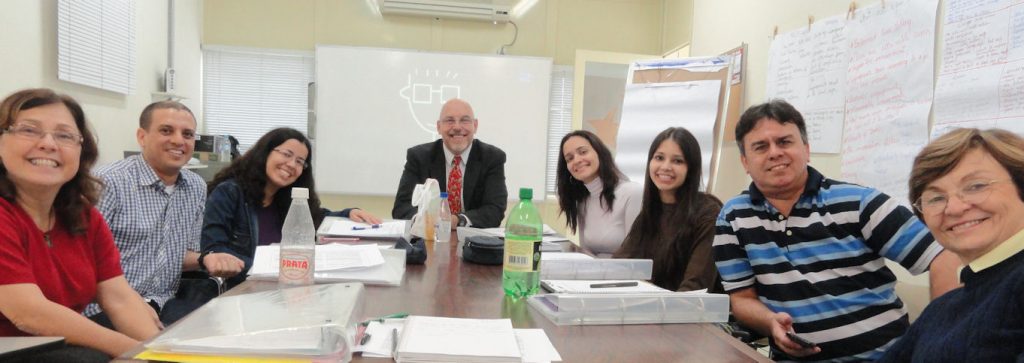
I had fun talking to these Brazilian English teachers featured in the photo above. They were taking part in a workshop at the Campinas BNC. They said that they don’t get many opportunities to talk with real native speakers. As a poor speaker of several languages not my own, I sympathized when they said that it was easier to understand each other than a native speaker. Learners of English as a second language are more careful than native English speakers and Brazilians can appreciate the accents of their fellows. These teachers were in Campinas for training partially supported by one of our grants. One of my jobs is to evaluate grants. This one is working.
I asked them why they wanted to learn & teach English. They all answered in similar ways, saying that it opened the world for them. One man mentioned his trip to Istanbul, where English was his key to communicating with the Turks. They were all enthusiastic about the program.
Actually, I think I should revise that statement about “language not my own” that I made above. My “other” languages are really more mine, since I had to buy them with a lot more hard work. I recall an old news clip of John Wayne talking to a hostile group of hippies during the 1960s. One of the kids asked derisively if John Wayne had his own hair. Wayne, who was bald, tipped his toupee and said, “it better be mine; I paid for it.” As a former classical scholar, I also recall the line quoted in “I Claudius” that I learned in 9th grade Latin class – The golden hair that Gala wears is hers/Who would have thought it?/She swears it’s hers, and true she swears/For I know where she bought it! I wish I had such a good memory for things that were useful.

The BNC in Campinas has around 1800 students. They are rebuilding from a low of 1400 a couple of years ago. The BNC is the gold standard of English teaching. It supplies a more complete cultural experience than its rivals, but the rivals promise faster results. BNC leaders also say they lost lots of customers when former President Lula said or implied that English wasn’t very important. I don’t know much about this incident, but it seems to have been memorable to English teachers.
I was surprised to find that English was not more common in Campinas. But I understood that it is not as much an international center as I thought it was. After all, UNICAMP is a major university and there is the research lab and PUC Campinas. The presence of these made me expect more English. The particular thing that brought the problem to my attention was the local failure of our “English cubed” program.
In cooperation with the Coligação of BNCs, we created a program to bring Brazilian science students up to the level needed to study in the U.S. in the Science w/o Borders program. The BNC in Campinas was one of the institutions given scholarships to execute the program. They had to give back the money (which was redeployed to other centers) because they couldn’t find ten kids with the necessary proficiency that were also qualified and interested in the Science w/o Borders program. I am glad that the BNC leaders were honest and self aware enough to make the right decision.
If I can digress a bit, I have been coming up again and again against problems of scalability and absorption capacity. We have so many opportunities in Brazil, or at least it looks that way. But we seem to be scaling up faster than the system will bear. This includes our own staff, which has remained the same size with higher workloads, but also with our “customers.” This problem is exacerbated by our laudable (I think) desire to reach into previously under served communities. It is almost a tautology. Those who have been “under served” are generally under prepared and we (the U.S. Mission) do not have the resources to change this, at least over the short term.
Our biggest bottleneck is English capacity. Participation in our programs often requires reasonable English proficiency. It takes years to learn English and it requires a commitment of time and resources. I mistakenly presumed that there was a much larger pool of high intermediate and advanced English speakers.
But it makes sense if you think in terms of conditional probabilities. Think about the potential Science w/o Borders applicants. Start with proficient English speakers, not including those who have already signed up for Science w/o Borders with sufficient English scores. Now subtract all those not currently enrolled in college, minus those in their first or their last years. Next subtract all those who are not studying sciences. Among those left, we now have to count only those who want study outside Brazil and then move to the even smaller group who choose to study in the U.S. and want to do it this year. Suddenly, the massive numbers are not so massive. All this means that the potential customer base in Brazil is not very big and the customer base in any particular city might be too small to support the program. I have to think about ways to expand the market or find other avenues.
